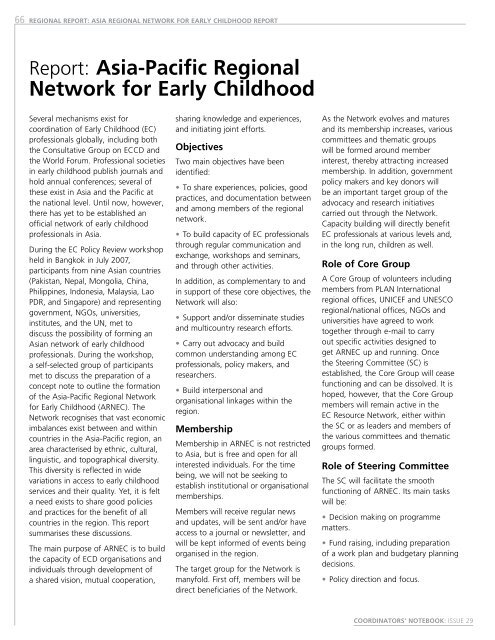A global call to action for early childhood
A global call to action for early childhood
A global call to action for early childhood
You also want an ePaper? Increase the reach of your titles
YUMPU automatically turns print PDFs into web optimized ePapers that Google loves.
66 REGIONAL REPORT: Asia Regional Network <strong>for</strong> Early Childhood report<br />
Report: Asia-Pacific Regional<br />
Network <strong>for</strong> Early Childhood<br />
Several mechanisms exist <strong>for</strong><br />
coordination of Early Childhood (EC)<br />
professionals <strong>global</strong>ly, including both<br />
the Consultative Group on ECCD and<br />
the World Forum. Professional societies<br />
in <strong>early</strong> <strong>childhood</strong> publish journals and<br />
hold annual conferences; several of<br />
these exist in Asia and the Pacific at<br />
the national level. Until now, however,<br />
there has yet <strong>to</strong> be established an<br />
official network of <strong>early</strong> <strong>childhood</strong><br />
professionals in Asia.<br />
During the EC Policy Review workshop<br />
held in Bangkok in July 2007,<br />
participants from nine Asian countries<br />
(Pakistan, Nepal, Mongolia, China,<br />
Philippines, Indonesia, Malaysia, Lao<br />
PDR, and Singapore) and representing<br />
government, NGOs, universities,<br />
institutes, and the UN, met <strong>to</strong><br />
discuss the possibility of <strong>for</strong>ming an<br />
Asian network of <strong>early</strong> <strong>childhood</strong><br />
professionals. During the workshop,<br />
a self-selected group of participants<br />
met <strong>to</strong> discuss the preparation of a<br />
concept note <strong>to</strong> outline the <strong>for</strong>mation<br />
of the Asia-Pacific Regional Network<br />
<strong>for</strong> Early Childhood (ARNEC). The<br />
Network recognises that vast economic<br />
imbalances exist between and within<br />
countries in the Asia-Pacific region, an<br />
area characterised by ethnic, cultural,<br />
linguistic, and <strong>to</strong>pographical diversity.<br />
This diversity is reflected in wide<br />
variations in access <strong>to</strong> <strong>early</strong> <strong>childhood</strong><br />
services and their quality. Yet, it is felt<br />
a need exists <strong>to</strong> share good policies<br />
and practices <strong>for</strong> the benefit of all<br />
countries in the region. This report<br />
summarises these discussions.<br />
The main purpose of ARNEC is <strong>to</strong> build<br />
the capacity of ECD organisations and<br />
individuals through development of<br />
a shared vision, mutual cooperation,<br />
sharing knowledge and experiences,<br />
and initiating joint ef<strong>for</strong>ts.<br />
Objectives<br />
Two main objectives have been<br />
identified:<br />
• To share experiences, policies, good<br />
practices, and documentation between<br />
and among members of the regional<br />
network.<br />
• To build capacity of EC professionals<br />
through regular communication and<br />
exchange, workshops and seminars,<br />
and through other activities.<br />
In addition, as complementary <strong>to</strong> and<br />
in support of these core objectives, the<br />
Network will also:<br />
• Support and/or disseminate studies<br />
and multicountry research ef<strong>for</strong>ts.<br />
• Carry out advocacy and build<br />
common understanding among EC<br />
professionals, policy makers, and<br />
researchers.<br />
• Build interpersonal and<br />
organisational linkages within the<br />
region.<br />
Membership<br />
Membership in ARNEC is not restricted<br />
<strong>to</strong> Asia, but is free and open <strong>for</strong> all<br />
interested individuals. For the time<br />
being, we will not be seeking <strong>to</strong><br />
establish institutional or organisational<br />
memberships.<br />
Members will receive regular news<br />
and updates, will be sent and/or have<br />
access <strong>to</strong> a journal or newsletter, and<br />
will be kept in<strong>for</strong>med of events being<br />
organised in the region.<br />
The target group <strong>for</strong> the Network is<br />
manyfold. First off, members will be<br />
direct beneficiaries of the Network.<br />
As the Network evolves and matures<br />
and its membership increases, various<br />
committees and thematic groups<br />
will be <strong>for</strong>med around member<br />
interest, thereby attracting increased<br />
membership. In addition, government<br />
policy makers and key donors will<br />
be an important target group of the<br />
advocacy and research initiatives<br />
carried out through the Network.<br />
Capacity building will directly benefit<br />
EC professionals at various levels and,<br />
in the long run, children as well.<br />
Role of Core Group<br />
A Core Group of volunteers including<br />
members from PLAN International<br />
regional offices, UNICEF and UNESCO<br />
regional/national offices, NGOs and<br />
universities have agreed <strong>to</strong> work<br />
<strong>to</strong>gether through e-mail <strong>to</strong> carry<br />
out specific activities designed <strong>to</strong><br />
get ARNEC up and running. Once<br />
the Steering Committee (SC) is<br />
established, the Core Group will cease<br />
functioning and can be dissolved. It is<br />
hoped, however, that the Core Group<br />
members will remain active in the<br />
EC Resource Network, either within<br />
the SC or as leaders and members of<br />
the various committees and thematic<br />
groups <strong>for</strong>med.<br />
Role of Steering Committee<br />
The SC will facilitate the smooth<br />
functioning of ARNEC. Its main tasks<br />
will be:<br />
• Decision making on programme<br />
matters.<br />
• Fund raising, including preparation<br />
of a work plan and budgetary planning<br />
decisions.<br />
• Policy direction and focus.<br />
COORDINATORS’ NOTEBOOK: ISSUE 29
















